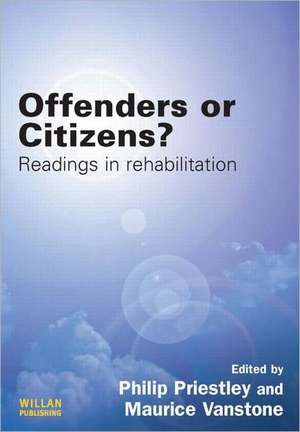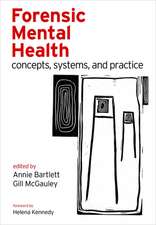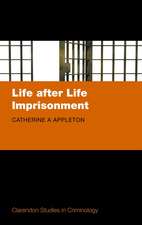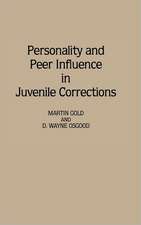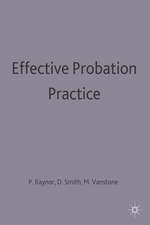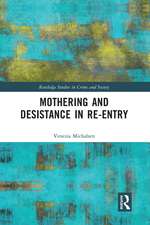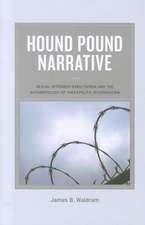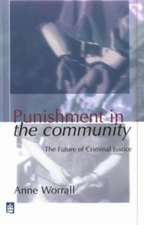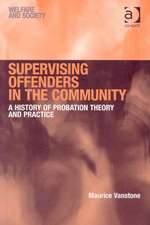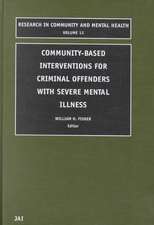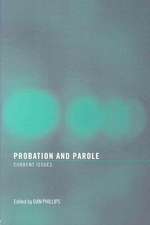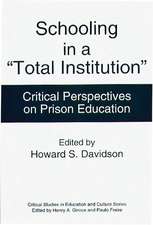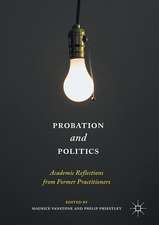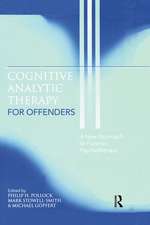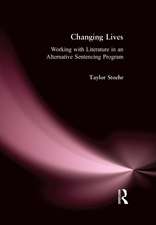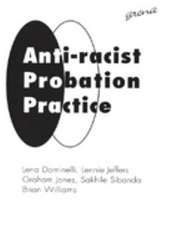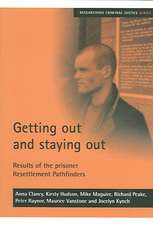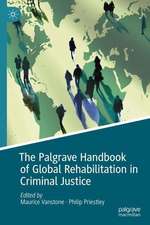Offenders or Citizens?: Readings in Rehabilitation
Editat de Philip Priestley, Maurice Vanstoneen Limba Engleză Paperback – mai 2010
This book will be essential reading for both students and practitioners within criminal justice, who have an interest in the rehabilitation of convicted individuals, and providing an essential broader context to the 'what works' debate.
Preț: 374.36 lei
Nou
Puncte Express: 562
Preț estimativ în valută:
71.64€ • 77.79$ • 60.18£
71.64€ • 77.79$ • 60.18£
Carte disponibilă
Livrare economică 01-15 aprilie
Livrare express 18-22 martie pentru 42.25 lei
Preluare comenzi: 021 569.72.76
Specificații
ISBN-13: 9781843925293
ISBN-10: 184392529X
Pagini: 346
Dimensiuni: 174 x 246 x 23 mm
Greutate: 0.7 kg
Ediția:New.
Editura: Taylor & Francis
Colecția Willan
Locul publicării:Oxford, United Kingdom
ISBN-10: 184392529X
Pagini: 346
Dimensiuni: 174 x 246 x 23 mm
Greutate: 0.7 kg
Ediția:New.
Editura: Taylor & Francis
Colecția Willan
Locul publicării:Oxford, United Kingdom
Cuprins
General Introduction Part 1: The Historical Roots and Early Forms of Rehabilitation Part 2: Modern Trends and Forms Part 3:The Future - Can Rehabilitation be Rehabilitated? Conclusion
Included within this reader is work from (amongst others) Clarence Darrow, Thomas Holmes, Raymond Saleilles, Cecil Leeson, Mrs. Cary, H. Chinn, C. Rankin, Mary Gordon, F. Poulton, Sheldon Glueck, Victor Serge, Philip Priestley, H. Weiss, L. Le Mesurier, R. R. W. Golding, F. P. Biestek, D. Bissell, M. K. McCullough, M. Freeguard, A.W. Hunt, Melitta Schmideberg, Geoffrey Parkinson, C. S. Lewis, Barbara Wootton, Paul Halmos, K. Berntsen, K. Christiansen, Robert Martinson, Mac Davis, W. J. Reid, L. Epstein, John Harding, Margaret Shaw, John McVicar, Martin Davies, S.R. Brody, Philip Bean, Jimmy Boyle, Malcolm Bryant, Peter Raynor, Anthony Bottoms, Bill McWilliams, Ronald Blackburn, A.R. Stanley, Nils Christie, Christine Weaver, Charles Fox, Gray Cavender, James McGuire, Hugh Morley, Robert Ross, Jerome Miller, David Garland, Martin Wright, John Patten, Malcolm Feeley, Jonathan Simon, Maurice Vanstone, Marion Jones, Brian Caddick, Carl Ake Farbring, Orville G. Brim, L. Kohlberg, Thomas Meisenhelder, Kevin N. Wright, Jim Lawson, Edgardo Rotman, Willem de Haan, Ron Fagan, Doris Layton MacKenzie, Chris Hignett, Howard Zehr, Stephen Farrall, G. Bazemore, J. Stinchcomb, E. J. Gumz, Tony Ward, Mark Brown, Joan Petersilia, James Gilligan, Bandy Lee, S. Lewis, C. West Huddleston III, Ros Burnett, Thomas K. Kenemore, Gwen Robinson, Patrick Williams Francis T. Cullen, Robert V. Wolf, Rod Morgan.
Included within this reader is work from (amongst others) Clarence Darrow, Thomas Holmes, Raymond Saleilles, Cecil Leeson, Mrs. Cary, H. Chinn, C. Rankin, Mary Gordon, F. Poulton, Sheldon Glueck, Victor Serge, Philip Priestley, H. Weiss, L. Le Mesurier, R. R. W. Golding, F. P. Biestek, D. Bissell, M. K. McCullough, M. Freeguard, A.W. Hunt, Melitta Schmideberg, Geoffrey Parkinson, C. S. Lewis, Barbara Wootton, Paul Halmos, K. Berntsen, K. Christiansen, Robert Martinson, Mac Davis, W. J. Reid, L. Epstein, John Harding, Margaret Shaw, John McVicar, Martin Davies, S.R. Brody, Philip Bean, Jimmy Boyle, Malcolm Bryant, Peter Raynor, Anthony Bottoms, Bill McWilliams, Ronald Blackburn, A.R. Stanley, Nils Christie, Christine Weaver, Charles Fox, Gray Cavender, James McGuire, Hugh Morley, Robert Ross, Jerome Miller, David Garland, Martin Wright, John Patten, Malcolm Feeley, Jonathan Simon, Maurice Vanstone, Marion Jones, Brian Caddick, Carl Ake Farbring, Orville G. Brim, L. Kohlberg, Thomas Meisenhelder, Kevin N. Wright, Jim Lawson, Edgardo Rotman, Willem de Haan, Ron Fagan, Doris Layton MacKenzie, Chris Hignett, Howard Zehr, Stephen Farrall, G. Bazemore, J. Stinchcomb, E. J. Gumz, Tony Ward, Mark Brown, Joan Petersilia, James Gilligan, Bandy Lee, S. Lewis, C. West Huddleston III, Ros Burnett, Thomas K. Kenemore, Gwen Robinson, Patrick Williams Francis T. Cullen, Robert V. Wolf, Rod Morgan.
Recenzii
'Priestley and Vanstone are, quite simply, among the best in the business and they have not disappointed with this inspired and inspiring collection. Moreover, I agree with the authors that the 'time is right' for a collection like this. The convergance of various paradigms in the literature (restorative justice, therapeutic jurisprudence, re-entry, desistance, etc), neatly described in Section Three of this book, have brought rehabilitation very much to the foreground in criminological thought again.' – Professor Shadd Maruna, Queen's University, Belfast
'This reader on rehabilitation could not be more timely for practitioners and academics. Probation practitioners in the UK are waiting to see what the government's stated 'rehabilitation revolution' will bring. European criminologists will have been stimulated by the European Journal of Probation's special edition on judicial rehabilitation and Maruna's (2011) call to promote active, not passive, rehabilitation and to provide certificates of rehabilitation. Anyone wishing to understand and participate in these debates should read this excellent and important collection.'
'[The editors'] conclusion that rehabilitation is a message of promotion of justice, inclusion education and optimism is a strong one and is well supported by the contents of this excellent book.'
-Dr Brian Stout, Associate Head, School of Applied Social Sciences, De Montfort University
'Forgive my misappropriation of the English language, but we have indeed got ourselves ‘A Reader’: a quite amazing collection of texts.
In producing such a quirky but beautifully concocted collection, the editors (and publisher) should be congratulated on the way they have distilled the various philosophical positions and show (much more importantly in the editors’ view) the practical applications stemming from such ideas. This is an enjoyable read and social workers will be heartened by a lot of what is here, not least the call for a renewal of faith in, and respect towards, the profession. However, the book is more than a well-crafted piece of academic labour. The book’s stated aim is to stimulate and furnish a debate about the proper place of rehabilitation within a plural, morally defensible and effective response to crime. The editors are agitating for a counter-revolution necessitating political will to revisit the original vision of rehabilitation, one that promotes inclusion, education and belief in self-change based on collaborative relationships engendering activecitizenship.
A powerful, persuasive and pleasurable read. Highly recommended.'
– Ian Paylor, Lancaster University in Br J Soc Work (2011) 41 (4): 799-800
'This ‘reader’ is an outstanding compendium of ninety-eight essays on the subject matter of rehabilitation. It is highly accessible in that most of the texts are just two or three pages in length. There is an impressive assortment of contributions which include those of academics drawn from across the social sciences, social care perspectives provided by practitioners from within the Criminal Justice System, and important statements from popular culture. This is a truly excellent ‘reader’, providing a well balanced à la carte menu on this subject.'
'I found it a helpful and enjoyable read. Probation practitioners will find it encouraging; students in Social Work, Probation Studies and allied disciplines of Criminology will also find it helpful....‘Offenders or Citizens?’ is an excellent book which I would wholeheartedly recommend.'
-Ray Crews, Senior Probation Officer, London Probation Trust, in European Journal of Probation vol 4 no 1 p130-132
'This is a splendid collection of readings that takes the reader on a metaphorical journey through 120 years of rehabilitation within the criminal justice system.'
'This selection of readings will, I believe, infuse and fuel debate. It offers encouragement that rehabilitation remains a key factor in protecting communities and changing behaviours and attitudes of offenders, and that it requires a collaborative approach that involves a range of individuals and groups – not least the offender. Highly recommended and an enjoyable, inspirational read.'
-Mark Nicholson, Area Manager, Probation Board for Northern Ireland, in the Irish Probation Journal vol 8 Oct 2011
'As a probation practitioner who retains an ongoing interest in the theoretical side of the work I would certainly recommend this book. For those interested in rehabilitation the collection provides an excellent introduction, covering a wide range of perspectives and developments. However, this book does far more than simply appraise the reader of the relevant issues. Whilst Parts One and Two provide an interesting and necessary historical context to the present, Part Three is an invitation to engage with current ideas and partake in the process of rescuing rehabilitation as a legitimate response to crime.Within the National Probation Service at present there is much talk of the rise of professional judgement and an increasing focus on ‘payment by results’ with a view to driving innovation and development. In such a context it is important that those interested in rehabilitation make their voices heard. This book goes some way to providing both the knowledge and inspiration required for such a task.'
-Jon Mathews, Probation Officer, Wales Probation Trust in Probation Journal, vol 59 no 2 p171-173
'This reader on rehabilitation could not be more timely for practitioners and academics. Probation practitioners in the UK are waiting to see what the government's stated 'rehabilitation revolution' will bring. European criminologists will have been stimulated by the European Journal of Probation's special edition on judicial rehabilitation and Maruna's (2011) call to promote active, not passive, rehabilitation and to provide certificates of rehabilitation. Anyone wishing to understand and participate in these debates should read this excellent and important collection.'
'[The editors'] conclusion that rehabilitation is a message of promotion of justice, inclusion education and optimism is a strong one and is well supported by the contents of this excellent book.'
-Dr Brian Stout, Associate Head, School of Applied Social Sciences, De Montfort University
'Forgive my misappropriation of the English language, but we have indeed got ourselves ‘A Reader’: a quite amazing collection of texts.
In producing such a quirky but beautifully concocted collection, the editors (and publisher) should be congratulated on the way they have distilled the various philosophical positions and show (much more importantly in the editors’ view) the practical applications stemming from such ideas. This is an enjoyable read and social workers will be heartened by a lot of what is here, not least the call for a renewal of faith in, and respect towards, the profession. However, the book is more than a well-crafted piece of academic labour. The book’s stated aim is to stimulate and furnish a debate about the proper place of rehabilitation within a plural, morally defensible and effective response to crime. The editors are agitating for a counter-revolution necessitating political will to revisit the original vision of rehabilitation, one that promotes inclusion, education and belief in self-change based on collaborative relationships engendering activecitizenship.
A powerful, persuasive and pleasurable read. Highly recommended.'
– Ian Paylor, Lancaster University in Br J Soc Work (2011) 41 (4): 799-800
'This ‘reader’ is an outstanding compendium of ninety-eight essays on the subject matter of rehabilitation. It is highly accessible in that most of the texts are just two or three pages in length. There is an impressive assortment of contributions which include those of academics drawn from across the social sciences, social care perspectives provided by practitioners from within the Criminal Justice System, and important statements from popular culture. This is a truly excellent ‘reader’, providing a well balanced à la carte menu on this subject.'
'I found it a helpful and enjoyable read. Probation practitioners will find it encouraging; students in Social Work, Probation Studies and allied disciplines of Criminology will also find it helpful....‘Offenders or Citizens?’ is an excellent book which I would wholeheartedly recommend.'
-Ray Crews, Senior Probation Officer, London Probation Trust, in European Journal of Probation vol 4 no 1 p130-132
'This is a splendid collection of readings that takes the reader on a metaphorical journey through 120 years of rehabilitation within the criminal justice system.'
'This selection of readings will, I believe, infuse and fuel debate. It offers encouragement that rehabilitation remains a key factor in protecting communities and changing behaviours and attitudes of offenders, and that it requires a collaborative approach that involves a range of individuals and groups – not least the offender. Highly recommended and an enjoyable, inspirational read.'
-Mark Nicholson, Area Manager, Probation Board for Northern Ireland, in the Irish Probation Journal vol 8 Oct 2011
'As a probation practitioner who retains an ongoing interest in the theoretical side of the work I would certainly recommend this book. For those interested in rehabilitation the collection provides an excellent introduction, covering a wide range of perspectives and developments. However, this book does far more than simply appraise the reader of the relevant issues. Whilst Parts One and Two provide an interesting and necessary historical context to the present, Part Three is an invitation to engage with current ideas and partake in the process of rescuing rehabilitation as a legitimate response to crime.Within the National Probation Service at present there is much talk of the rise of professional judgement and an increasing focus on ‘payment by results’ with a view to driving innovation and development. In such a context it is important that those interested in rehabilitation make their voices heard. This book goes some way to providing both the knowledge and inspiration required for such a task.'
-Jon Mathews, Probation Officer, Wales Probation Trust in Probation Journal, vol 59 no 2 p171-173
Notă biografică
Philip Priestley, Maurice Vanstone
Descriere
This book stimulates and furnishes a debate about the proper place of rehabilitation within a plural, morally defensible, and effective response to crime and will be essential reading for both students and practitioners within criminal justice.
